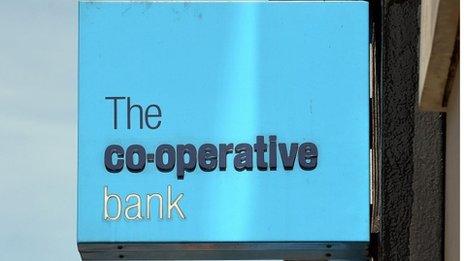Sir Christopher Kelly - why the Co-op nearly blew up
- Published
- comments

Another day, another rumble from the belly of the Co-op beast. Sir Christopher Kelly's report into the near-collapse of the Co-op Bank and the subsequent problems at the Co-op Group is not quite the final word on one of the most spectacular falls from grace since the financial crisis.
There are still reports from the Treasury Select Committee, the investigation by the Financial Conduct Authority and the inquiry by the Treasury itself to come.
But Sir Christopher's report is the most comprehensive attempt so far to draw together what happened to cause such a calamity.
It is due to be published next week, but a number of drafts are already in circulation and the arguments over who is right and who is wrong on why the Co-op nearly failed have already started behind the scenes.
Blame
At the heart of the report, I have been told, is the takeover of the Britannia Building Society in 2008 and 2009. Sources have revealed that in a late stage draft of the report, Sir Christopher argues that both the Co-op Group and the Co-op Bank were "culpable" for the problems with the takeover.
Due diligence over Britannia's commercial real estate was "extremely cursory", according to drafts of the report. Ultimately, impairments linked to the takeover totalled £560m.
Sir Christopher says that the organisation took "its eye off the ball" - careful wording (mandarin-like, even) for a deal that caused a significant part of the Co-op Group's problems. He says that the lack of governance was at group as well as bank level.
The 150-page draft does go into the Somerfield takeover but I am told that it does not put as much weight on that deal as it does on Britannia. By the time of the Co-op's attempts to take over the Lloyds bank branches in 2012, the die had already been cast.
'Inaccuracies'
Sir Christopher's report is likely to split those who read it, particularly former members of the Britannia who feel that they have been unfairly blamed for all the ills at the bank and the group.
I understand that a number of them, including Neville Richardson, the former chief executive of the Britannia who subsequently had a senior role running the merged bank, will write to Sir Christopher claiming the report contains "factual inaccuracies".
Mr Richardson, who left the Co-op in the summer of 2011, argues that it was only after his departure that the business became over-stretched. He says he warned the organisation it was taking on too much.
The letter is likely to say that not enough weight has been put on the Co-op Bank's own impairments which could total more than £400m. The collapse of the deal to buy the Lloyds branches also left the bank with a bill of several hundred million pounds and a troublesome IT system costing £300m.
It is not clear how Sir Christopher will react to the letter. If he publishes the report so that it has a similar thrust to the draft, then it is likely that the Britannia camp will go public with their concerns.